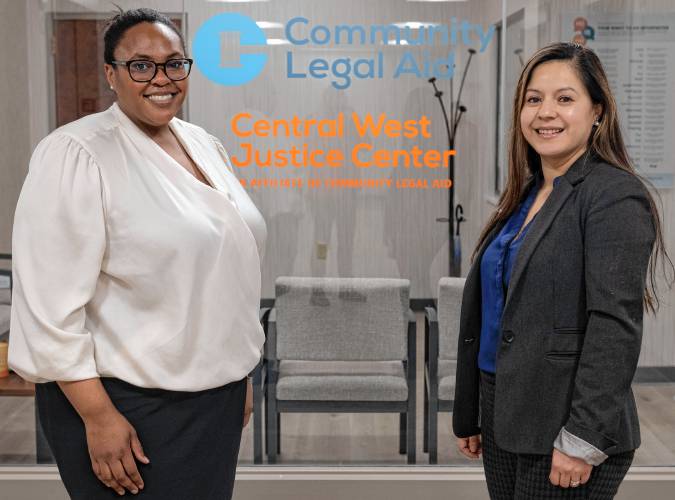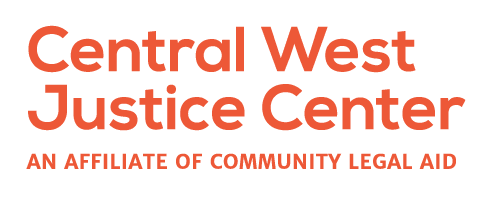
February 7, 2025
Dream job for new head of Central West Justice Center legal aid nonprofit
BY Amherst Bulletin
NORTHAMPTON — Nothing could knock down Claudia Quintero on the day she received her green card and work permit at 17 years old — she was too elated to notice anything else.
Years after achieving her legal status, Quintero brings her and her community’s experiences, in addition to legal accolades and long list of community engagement work with farmworkers and migrants, to her work as Central West Justice Center’s newest director. She replaces attorney Kristen Williams, who was simultaneously named chief operating officer at Community Legal Aid, a free legal aid nonprofit and the parent nonprofit of Central West Justice Center.
“I think part of it is having an intimate understanding of what our clients go through that allows you to have a deeper sympathy for who they are as people and why they might not answer the phone when you call them, especially in an era like we are in now,” Quintero said.
Quintero grew up in an immigrant community in Los Angeles, keenly aware of her undocumented status and her mother’s efforts to protect her from immigration enforcement. When she decided to begin applying for college, Quintero’s guidance councilor told her she would not be able to go without legal documents.
“I still remember that week now so many years later, just feeling so devastated and so sad because all I wanted was to go to college,” Quintero said. “I grew up very academically inclined, so I always wanted to be in school. I always wanted to learn and I would read books about kids who were in college, and I was like, that sounds so fun.”
While at a community event with her Mexican dance company Folklorico Revolución, Quintero spotted a flyer advertising free legal advice for children needing help with immigration. She called the number on the little pamphlet without her mother’s knowledge, who mistrusted lawyers. After all, Quintero noted, lawyers are typically expensive and sometimes can’t get the desired results. In a worst-case scenario, she feared, they could be reported to authorities and deported.
After begging her mother to speak with one of the staff, the Chilean lawyer they met with, who’s now a close friend, said Quintero could go to college if she received a green card before the age of 18.
“She was so kind, and gave me hope but also alleviated my mom’s fears and my fears,” Quintero said. “She’s like, ‘I’m gonna protect you. We’re gonna do the best we can so we move through the process pretty quickly,’ and at the end of six months I had a green card.”
Her legal document not only sprung Quintero into college, but inspired her to pursue law, particularly the same nonprofit legal work as the lawyers who helped her acquire a green card.
“In that moment, like I was like this is what I wanna do,” she said. “This moment that I have, that somebody has done for me, where I felt I was standing literally in front of this gate that was locked, and there was no way for me to get around it, and the doors just opened, that’s what I wanna do for people. I wanna be a lawyer, too.”
The change in leadership of Central West Justice Center and Community Legal Aid, which serve and have offices in Berkshire, Franklin, Hampden, Hampshire, and Worcester counties, occurs as the Trump administration follows through on campaign promises of mass deportations of immigrants and the removal of nonbinary status from legal documents. Many of President Trump’s campaign promises could directly impact Community Legal Aid’s clientele, such as LGBTQ+ people, migrants and low-income families.
While coming into their new positions, both Williams and Quintero are preparing their robust staff for the legal challenges residents may face.
“We are always talking to the community, talking to our community partners, talking to our client populations to figure out other places where, if we can’t grow, we need to pivot,” Williams said. “During COVID, there was a eviction moratorium so that required us to pivot some of our housing work to some other work temporarily. There was a lot more unemployment, so we pivoted a lot of our work to unemployment. I assume we will do the same thing if we respond to community need, whether that looks like growth or pivoting.”
Both Community Legal Aid and Central West Justice Center have grown exponentially in staff, funding and caseloads since Williams joined Community Legal Aid in 2014 and Quintero began at the Central West Justice Center in 2017. This growth specifically began during the COVID-19 pandemic as more Massachusetts residents faced housing and employment challenges.
Collectively, both nonprofits handled 8,743 cases in 2024, which represents an approximately 25% growth since 2019. A staff of attorneys, paralegals, case mangers and support staff has roughly doubled since 2019, from 115 to a total of 196 employees in 2024.
“I think that handling the day-to-day cases can be really exhausting for a lot of folks, myself included,” Williams said. “There has to be people on the back end doing the work that I’m doing to make sure the stuff that’s happening on the ground can continue to happen.”
Williams has worked with many eviction, unemployment and Social Security cases during her time as a AmeriCorps member and staff attorney at Community Legal Aid.
“I think we’ve been lucky as an organization to have leaders who understand these communities like Kristen, who was the former director,” Quintero said. “I felt like I could bring skills that would allow me to support not only our clients but our staff as somebody who grew up an immigrant, who grew up in a working class community, who is part of the LGBTQ community.”
A lot of their community work now, Quintero and Williams said, has been educating the public on the difference between immediate dangers, like deportation, and potential perils that haven’t quite come to fruition.
“We’re sharing that information with our community partners and our other legal partners so that we are a better position to support the community,” she said.
That support can work two ways, she said.
“Sometimes when I feel overwhelmed by my work, just talking to a client is so inspiring because they’ve gone through so much adversity and yet they’re still there sitting right in front of me talking about the hope of getting wages back or getting some immigration relief for stabilizing housing,” Quintero said.
“This is a story about Kristen and I, and the new leadership of this organization to some extent, but it’s also a story about our clients and how they help us help them by showing us how to be strong and resilient.”
